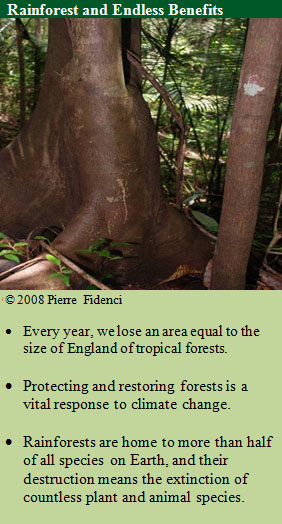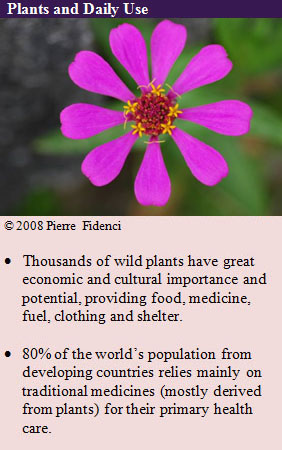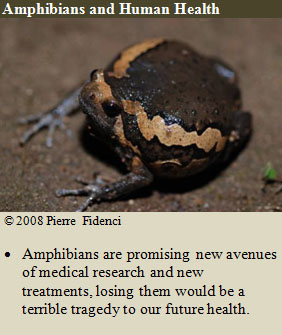|
Biodiversity is the variety of life (its ecosystems, populations, species and genes). Saving endangered species (plants and animals) from becoming extinct and protecting their wild places is crucial for our health and the future of our children.
As species are lost so too are our options for future discovery and advancement. The impacts of biodiversity loss include clearly into fewer new medicines, greater vulnerability to natural disasters and greater effects from global warming.
Biodiversity provides us with tremendous vital benefits:
Air Purification
Forests filter particulates and help regulate the composition of the atmosphere and purify our air. Loosing forest around the world increases air pollution.
Poverty Alleviation
Biological diversity provides the world's population, particularly the poor, with food, medicines, building materials, bioenergy and protection against natural disasters.
Health
Of the medicines currently available, about 50% are derived from natural products. At least 120 chemical compounds, derived from 90 plant species, are important drugs currently in use in many countries around the world! By loosing biodiversity, we are losing the chance to discover new medicines that could end the suffering of millions of people and save national economies billions of dollars each year.
Purification of Fresh Waters
Nitrogen pollution became a serious problem many parts of the world. Protecting and restoring wetlands to reduce nitrogen loading is less expensive than the construction of wastewater treatment plants. Wetlands contain exceptional biodiversity and generate critical services such as purification of fresh waters. They also support the livelihoods of local communitie.
Agriculture
Many of the benefits of biodiversity accrue to agriculture itself. For example, the marine environment is a source for insecticides. Nereistoxin is an insecticidal poison isolated from the marine worm, Lumbrineris brevicirra. Others benefits include crop pollination, soil fertility services provided by microorganisms, and pest control services provided by insects and wildlife. Biodiversity loss has important implications for agriculture.
Mitigation of Floods
Floodplains are ecosystems that border rivers subject to flooding. Following excessive rains, flood waters flow over riverbanks and into these floodplain forests and wetlands. Some of the water is soaked up by the soil.
Pollination of Crops and Natural Vegetation
Many flowering plants rely on animals to help them mate by ensuring fertilization. Bees, butterflies, beetles, hummingbirds, bats, and other animals transport pollen, the male reproductive structures, from one plant to another, with enormous benefits to humanity. Approximately one third of the world’s food crops depends on these natural pollinators. In the U.S., honeybees pollinate about U.S. $10 billion worth of crops.
Carbon Sequestration
Carbon storage (sequestration) occurs in forests and soils primarily through the natural process of photosynthesis. The movement of carbon in and out of trees and soils is part of the Earth's global carbon cycle. Forests and coral reefs contain massive carbon reservoirs, which significantly contribute to regulating the global climate.
Buffering the Land against Ocean Storms
Mangrove forest protect coastlines against Vegetated banks bind the soil, preventing erosion caused by wave and surface water flow.
Preservation of Soil Fertility
Soils, with their active microbial and animal populations, have the capacity to supply adequate nutrients to plants in suitable proportions. Natural forest soil had a higher content of total nutrients and biomass.
Aesthetics and Spiritual
The natural world is beautiful and valued for its aesthetic appeal. Loss of biodiversity impoverishes our world of natural beauty and wonder, both for ourselves and for the future generations.
Links
|
|



|









